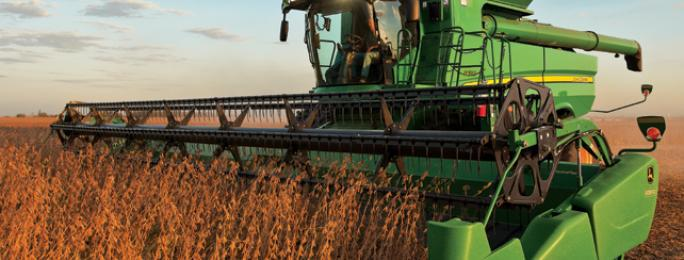College of Liberal Arts & Sciences
Iowa Climate Statement Urges Action on Climate-Smart Agriculture

“Iowa’s record September rainfall and flooding reminds us that climate change is real and needs to be addressed on both the farm and in our communities,” said David Courard‐Hauri, Director, Environmental Science and Policy Program at Drake University.
Over the past five years, Iowa researchers and educators at nearly every college and university in the state have produced annual statements describing the real impacts Iowans are experiencing from climate change.
The sixth annual statement, “Iowa Climate Statement 2016: The Multiple Benefits of Climate‐Smart Agriculture,” which was released today, was signed by 187 science faculty and researchers from 39 Iowa colleges and universities. The statement describes the benefits of more widespread adoption of proven soil conservation practices.
“In April 2015, U.S. Secretary of Agriculture Tom Vilsack announced the new U.S.D.A. initiative, Building Blocks for Climate‐Smart Agriculture. Through this program, Iowa’s former governor proposed expanding voluntary, incentive-based programs and initiatives to enable farmers, ranchers, and forest owners to confront human‐caused global warming,” said Courard‐Hauri.
“Iowa farmers are experiencing real impacts from climate change, including heavier rains, increased flooding and soil erosion,” said, Jerry Schnoor, co‐director of the UI Center for Global and Regional Environmental Research.
“Proven climate‐smart conservation strategies can help Iowa improve soil and plant health, store carbon, and create cleaner water. Reducing cropland tillage prevents soil erosion and land set‐aside programs can permanently stores carbon in soils,” said Schnoor.
“We believe Iowa should play a leadership role in this vital effort, just as our state has already done for wind energy. We urge our representatives to help Iowa’s innovative farmers and land managers establish a multi‐faceted vision for land stewardship by vigorously implementing federal, state, and other conservation programs,” said Schnoor.
The lead authors of the 2016 statement include Chris Anderson, Research Assistant Professor, Assistant Director, ISU Climate Science Program, Iowa State University (Chris recently left ISU joining a private sector renewable energy company), and Jerry Schnoor, Co‐director, Center for Global and Regional Environmental Research, University of Iowa and with editorial assistance from Connie Mutel, Senior Science Writer, IIHR, Hydroscience & Engineering, University of Iowa.
Also contributing to the statement were Gene Takle, Distinguished Professor of Geological & Atmospheric Sciences, Department of Agronomy, Iowa State University; David Courard‐Hauri, Director, Environmental Science and Policy Program, Drake University; Neil Bernstein, Department of Natural and Applied Sciences, Mount; Mercy University; Peter S. Thorne, Professor and Head, Occupational & Environmental Health, Director, Environmental Health Sciences Research Center, College of Public Health, University of Iowa; David Osterberg, Clinical Professor, Occupational & Environmental Health, College of Public Health, University of Iowa; Diane Debinski, Professor, Ecology, Evolution, and Organismal Biology, Iowa State, University; David A. Swenson, Associate Scientist, Department of Economics, Iowa State University; Greg Carmichael, Co‐director, Center for Global and Regional Environmental Research, University of Iowa; Kamyar Enshayan, Director, Center for Energy & Environmental Education, University of Northern Iowa; Elizabeth A. Stone, Assistant Professor, Department of Chemistry, University of Iowa.
Iowa Climate Impacts:
- There is clear evidence that the frequency of intense rain has increased in Iowa over the past 50 years.
- Natural systems are responding to the increase in the global average temperature. The northward expansion of species formerly restricted by a colder climate could disrupt natural ecosystems and introduce new agricultural pests and diseases.
- The changes are also expected to lead to negative health effects for Iowans, including the direct impacts of flooding, stresses on the heart and lungs, allergens that are more abundant and have a longer season, and the spread of diseases carried by organisms like mosquitoes and ticks.
- If greenhouse gas emissions continue to increase, agriculture, human health, and economic stability will be affected in new and dramatic ways
About the Iowa Climate Statement: The Iowa Climate Statement is a unique effort by Iowa’s top scientists to describe how climate change is impacting Iowans. Science faculty and researchers from virtually every college and university support this effort. We are not aware of any similar effort anywhere in the country to provide state specific climate impacts to its citizens.
The 39 Colleges and Universities of statement endorsers:
Briar Cliff University
Central College
Clarke University
Clinton Community College
Coe College
Cornell College
Des Moines Area Community College
Des Moines University
Dordt College
Drake University
Eastern Iowa Community College
Ellsworth Community College
Grinnell College
Indian Hills Community College
Iowa Central Community College
Iowa Lakes Community College
Iowa State University
Iowa Valley Community College
Iowa Western Community College
Kirkwood Community College
Luther College
Maharishi University of Management
Morningside College
Mount Mercy University
Northeast Iowa Community College
Northwestern College
Scott Community College
Simpson College
Southeastern Community College
Southwestern Community College
Saint Ambrose University
University of Dubuque
University of Iowa
University of Northern Iowa
Upper Iowa University
Waldorf College
Wartburg College
Western Iowa Tech Community College
William Penn University
Endorser affiliations are for identification purposes only and do not reflect views of their academic institutions.